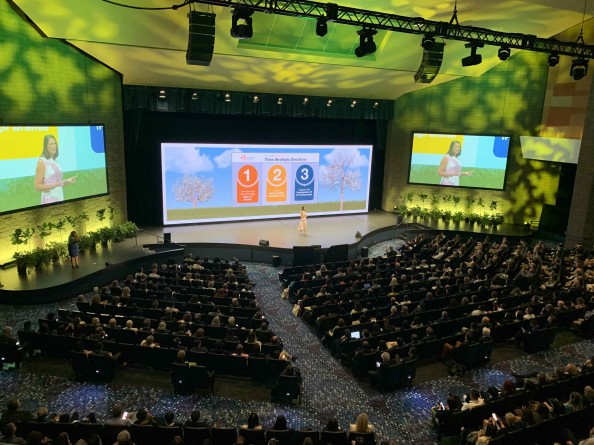INTA 2024: Sustainability is the future for brands – and their IP lawyers
19 May 2024

Sustainability is a key component for building brand value in the future, says Dana Northcott, INTA’s president and vice president and associate general counsel for Amazon’s intellectual property team. Northcott, speaking at the opening ceremony at INTA’s Annual Meeting in Atlanta, said that different brands have taken different approaches to sustainability, but that all should be focussed on the subject due, in part, to shifting demographics of consumers.
“There are brands in this room that have made sustainability a core part of their business. They’re innovating in ways that serve eco-conscious consumers and future generations. There are also brands in this room that have discreetly implemented sustainability initiatives, making positive environmental impacts. There are brands here in this room that have absolutely no idea where to begin, because the sustainability space can seem so big and mean so many different things to so many different people. And there are law firms in this room wondering how this applies to them,” she said.
Corporate social responsibility (CSR) is no longer just the icing on top of the great product or service brands provide, she warned, noting that sustainability reporting has become mandatory in several jurisdictions, the same way financial reporting and other legalities are.
“Sustainability reporting establishes important parameters for consumer trust, value and the reputation of brands. Consumer protection of sustainability is becoming increasingly important, [and that] drives brand value.”
That, she suggested, means that IP lawyers should be interested in sustainability, even if it isn’t part of a traditional IP practice.
“How does sustainability act to bring brand value? We have a generational opportunity to influence our businesses,” she said. “As brand owners, managers and IP legal professionals, we are in a unique position to meet this challenge head-on.”
Noting that INTA’s 2022-2025 strategic plan includes a pillar designed to build a better society through brands, she said that it is time to double-down on our focus on brands and sustainability and “turning years of words and warnings into actions and solutions.”
Northcott said that many in the world – and in the audience – were experiencing anxiety about the futures of their hometowns and of the planet in general, thanks to climate change and other environmental problems. “With this in mind, and thinking back to our key question about increasing brand value and at the same time champion sustainability. The answer might be that what’s good for the world is good for our brands.”
But the need for sustainability is more than just a desire to do good, Northcott said. Increasingly, how brands manage their CSR is influencing buying decisions, particularly among Gen Z consumers.
“Gen Z, born between 1997 and 2012, account for 30 percent of the world’s population today. By 2025, they will account for 27 percent of the global workforce and be the dominant consumer group,” she said. “Gen Z is also the first generation to grow up with the climate crisis, and they are encouraging brands to be much more transparent.”
Most Gen Z shoppers prefer to buy sustainable brands, and most are willing to spend 10 percent more on sustainable products, Northcott said. “Why? Because three-quarters of Gen Z consumers state that sustainability is more important than brand names. Seventy-five percent of Millenials are eco-conscious to the point of changing their buying habits to favour sustainable products.” Brands that are authentic and take action to be sustainable are rewarded by Gen Z consumers, she said.
The association is putting its environmental aspirations into play at the Annual Meeting, noted Urko Ochoa, Annual Meeting co-chair and a partner and head of IP at Miniño in Santo Domingo, Dominican Republic, who mentioned its carbon offset programme and efforts to promote more sustainable swag in the Brand Marketplace. “Our green swag competition challenges exhibitors to provide swag that has been thoughtfully and sustainably sourced using natural and recycled products,” Ochoa said.
INTA CEO Etienne Sanz de Acedo reported that 9,650 attendees had registered for INTA’s Annual Meeting this year, continuing an upward trend in attendance since the 2020 and 2021 Covid years when the conference was held virtually to crowds of less than 4,000 attendees. In 2022, the Washington Annual Meeting attracted 6,359 registrants; 8,305 attended in 2023 in Singapore.
“We have 136 countries that are represented here in Atlanta, more than a thousand corporate representatives and almost 200 officials from around the world,” he said.
In the same five-year period, the association has remained busy, passing 18 resolutions and filing 34 amicusbriefs and 155 testimonies and submissions around the world, and expanded its research agenda at the same time.
Sanz de Acedo called 2024 “a pivotal year”, noting that it is an election year for nearly half of the world’s eligible population, spread across 64 different countries, will cast their votes to elect their leaders. “At the same time, it’s a year of challenges, of trade conflicts, of political tensions of wars in Ukraine and Gaza. It’s a year of dramatic impacts of climate change. It’s also a year of economic recovery but at the same time of economic uncertainty and fragility. It’s also a year where we’re seeing an extremely fast-evolving of technologies in the world. All this is really impacting the way that as individuals we think, we feel, we behave. And that has created heightened concern about the future, both collectively and individually.”
What does that mean when it comes to IP? Sanz de Acedo reiterated that INTA’s priorities remain focussed on global harmonization of IP laws, fighting against counterfeiting and piracy and ensuring enforcement of IP rights. “It is also about fighting confusion among consumers through brand restrictions, and paying attention to internet governance and the importance of the online market,” he said.
The state of play today, he said, the value of IP on the economy continues to grow. “At the same time, we’re all noticing that some unregistered IP rights are gaining traction, and what’s more important, IP rights can no longer be looped into silos. IP professionals need to transform, leverage ourselves, and add technology and financial acumen and sensitivity to our skills. It’s probably time for all of us to start building for the future.”
To that end, he said, INTA’s strategic plan for 2026-2029 includes
“We need to start projecting ourselves into the future. We need to approach IP in a more holistic way. We need to better understand the impact of technology and finances into intellectual property, and we need to continue innovating and adding real value to our members, whether they be companies or law firms,” he said.
Sanz de Acedo also confirmed that the 2025 Annual Meeting will be held in San Diego.
– Gregory Glass, reporting from Atlanta






